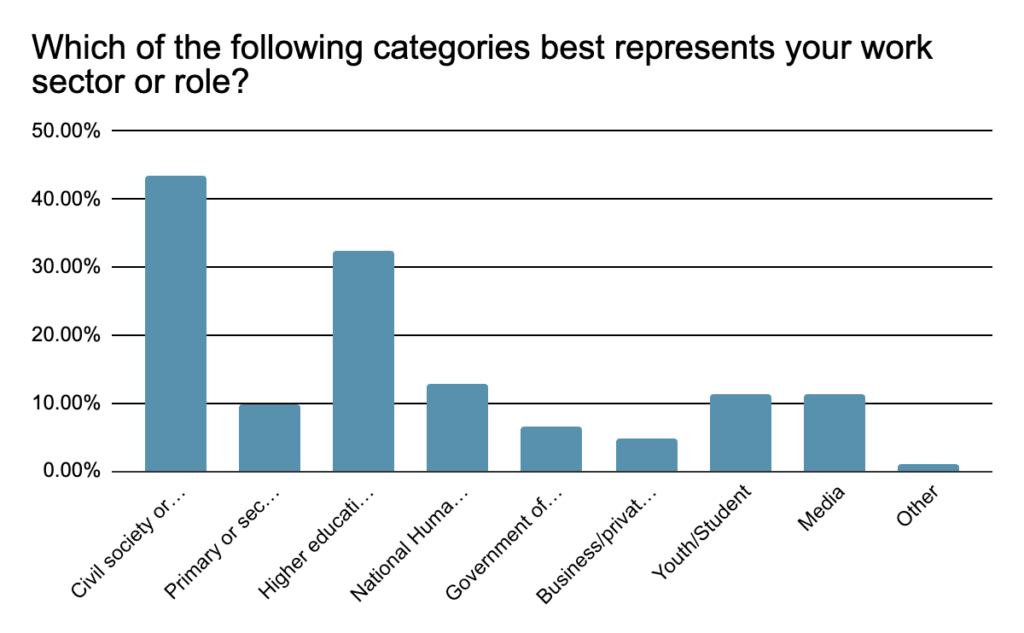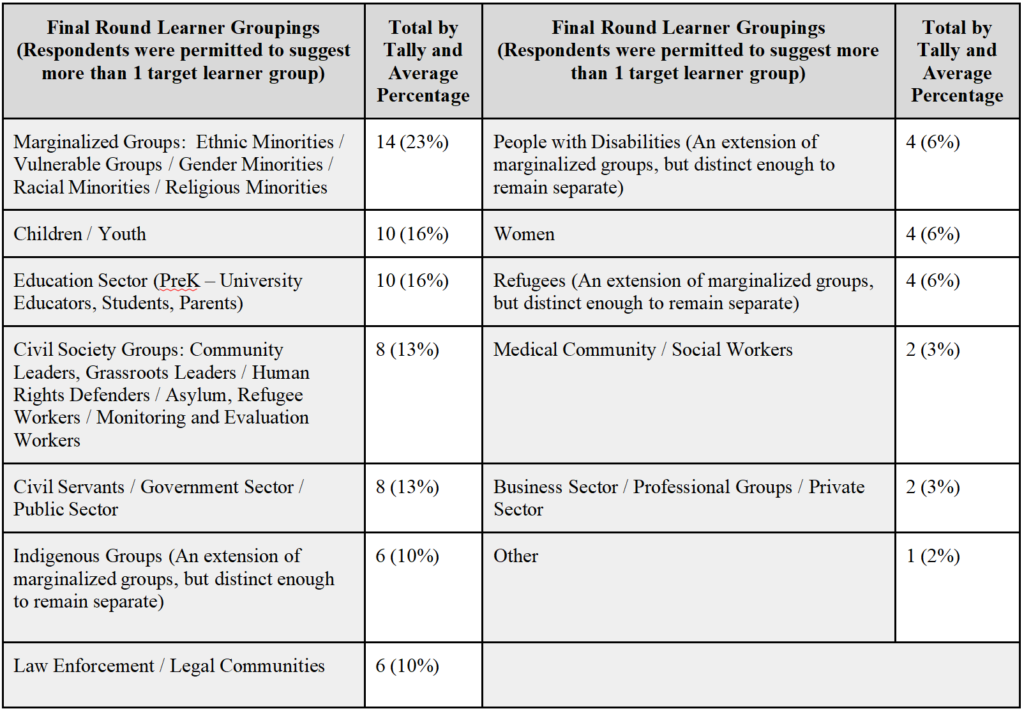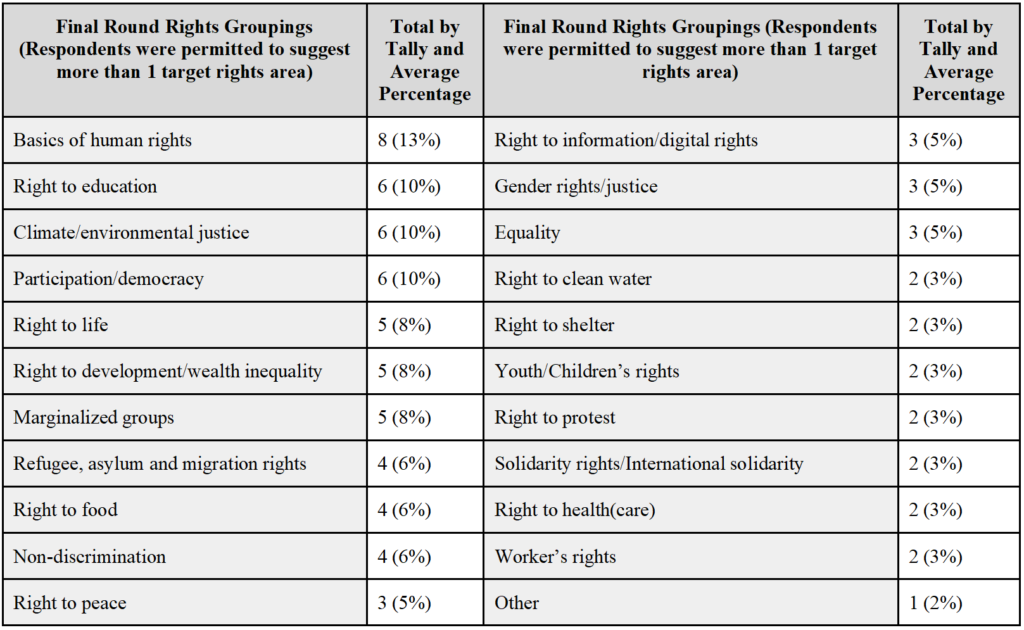Human Rights Education Associates (HREA)1 is pleased to submit to the UN Office of the High Commissioner for Human Rights the input of the HREA network on the focus of Phase 5 of the World Programme for Human Rights Education (WPHRE).
Background. HREA is a non-governmental organization that supports human rights education; the training of human rights defenders and professional groups; and the development of educational materials and programming. HREA works with individuals, non-governmental organizations, inter-governmental organizations, and governments interested in implementing human rights education programs.
HREA has a Global HRE network of 8,000 members from over 90 countries. These members were invited to submit their opinions on what would be desirable learner groups and themes for Phase 5 of the WPHRE, consistent with the questions that the UN Office of the High Commissioner for Human Rights (OHCHR) posed for stakeholders on their website. In addition to indicating priorities for the Phase 5, respondents were asked to justify their responses.
Respondents. HREA carried out this internal consultation from May 1 – 17, 2023 through the use of an online, anonymous survey. There was a total of 62 respondents, coming from 45 countries, distributed across different regions. (See Figure1 below.)
Figure 1

These respondents came primarily from the civil society sector (43.5%), with the second largest group coming from the higher education sector (32.3%).2 (See Figure 2 below.)
Figure 2

Methodology. The open-ended answers underwent two rounds of coding developed by two HREA researchers. The initial set of codes on learner groups and themes were closely related to the original language of the respondent; the second round of coding involved a conceptual clustering of responses. This report presents these second-order results as well as the interpretation of links between the proposed learner groups and themes.
Results. Tables 1 and 2 below reflect the results of the learner groups and human rights themes identified by respondents. The report reflects those responses indicated by at least two respondents.
Table 1 Learner Groups

Table 2 Human Rights Themes

Discussion. The most popular learner group identified (23%) were marginalized persons, including those identified as being part of a vulnerable group, and ethnic, gender, racial, and religious minorities. As Table 1 above indicates, there were five additional groups which could be categorized as marginalized (immigrants, people with HIV/AIDS, refugees, people with disabilities, and Indigenous groups), however these groups are distinct enough to warrant remaining separate categories. Many respondents believe that HRE should be carried out with and for those groups whose rights are under duress. This result coincided with the results for the thematic focus on marginalized groups (8%). Explanations for why marginalized groups should be the focus of the fifth phase of the WPHRE include respondents stating rationales such as marginalized groups “have less information about their rights and face the greatest threat and challenge in the realization of [those] rights.” Additionally, respondents stated that the program “should strive to empower marginalized groups” to address the “deepening divide which can be observed globally.”
The second and third most popular learner groups at 16 % each were children and youth (16%) and the formal education sector (16%), which can be seen as related. Although basic education and higher education have been recognized in earlier phases of the WPHRE, they remain a priority for many respondents. These learner groups coincide with the most popular content focus mentioned by respondents, basic human rights education (13%) as well as the right to education (10%). In other words, there is a recognized, ongoing need to deliver ‘the basics’ of human rights education with the formal and nonformal education system with children and youth. Respondents stated that children and youth should remain a focus due to the observation that education has the potential to reach the broadest audience and cut across sectors and cultures.
The fourth most popular learner group at 13% was civil servants and the government sector. This reflects an interest among many respondents to ensure that civil servants and governing bodies reflect human rights values. Respondents considered this learner group to be important because, as one person wrote, “government officials and members of the executive should be more familiarized with human rights and exercise better human rights solidarity [within] their functions.” Civil society groups, especially those working with marginalized populations, were tied at fourth place also at 13%. Respondents indicated that focusing efforts on civil society groups is vital given that “action starts at the ground level’ and can thus reach people across demographics, as well as those individuals who are at times “out of reach.”
We note here other learner groups that received some attention: Indigenous groups (10%), law enforcement/legal groups (10%), persons with disabilities (6%), women (6%) and refugees (6%).
Four areas of thematic interest emerged that were not evidently associated with a learner group. These are education about: climate/environmental justice (10%), participation in democratic processes (10%), the right to development/addressing wealth inequality (8%), and the right to life (8%). Each of these areas appears to be related to issues of pressing global concern, including climate change and the unequal distribution of vulnerability based on resources; the shrinking of civic space; and conflict/war.
Respondents expressed their interest in addressing climate and environmental justice due to increasing concerns around how “climate change is impacting a range of environments, from island states to temperate zones that [specifically impact] Indigenous populations with little resilience.” Furthermore, respondents elaborated the need to explore types of human rights violations incurred by climate change specifically as they impact Indigenous peoples; protections available to Indigenous peoples facing climate change impacts; and the ways Indigenous peoples can identify strategies to exercise such rights to protect themselves.
Regarding participation in the democratic process, respondents expressed their belief that engagement in the political process “is the center of social progress.” When respondents addressed the right to development and wealth inequality, they articulated that by “empowering right holders through development they will have the capacity to question or hold duty bearers accountable.” Regarding respondents’ interest in the right to life, they cited the ongoing and protracted nature of armed conflict across the globe, particularly the war against Ukraine.
Conclusion. The results of the HREA consultation demonstrate a range of HRE-related learner groups and themes. A focus on infusion of basic HRE within the formal and nonformal education of children and youth remain a sustained interest. Similarly, there is a strong focus on educating vulnerable groups about their human rights so that they can know and claim their rights, as well as educating allies among the more privileged. We also see learner groups and themes highlighted as a response to current challenges in the international system: Indigenous groups and climate change; refugees and asylum seekers; civic participation for human rights and democracy.
Notes:
1 This report was prepared by Jessica Terbrueggen and Felisa Tibbitts.
2 Respondents could indicate more than one sector of affiliation.
